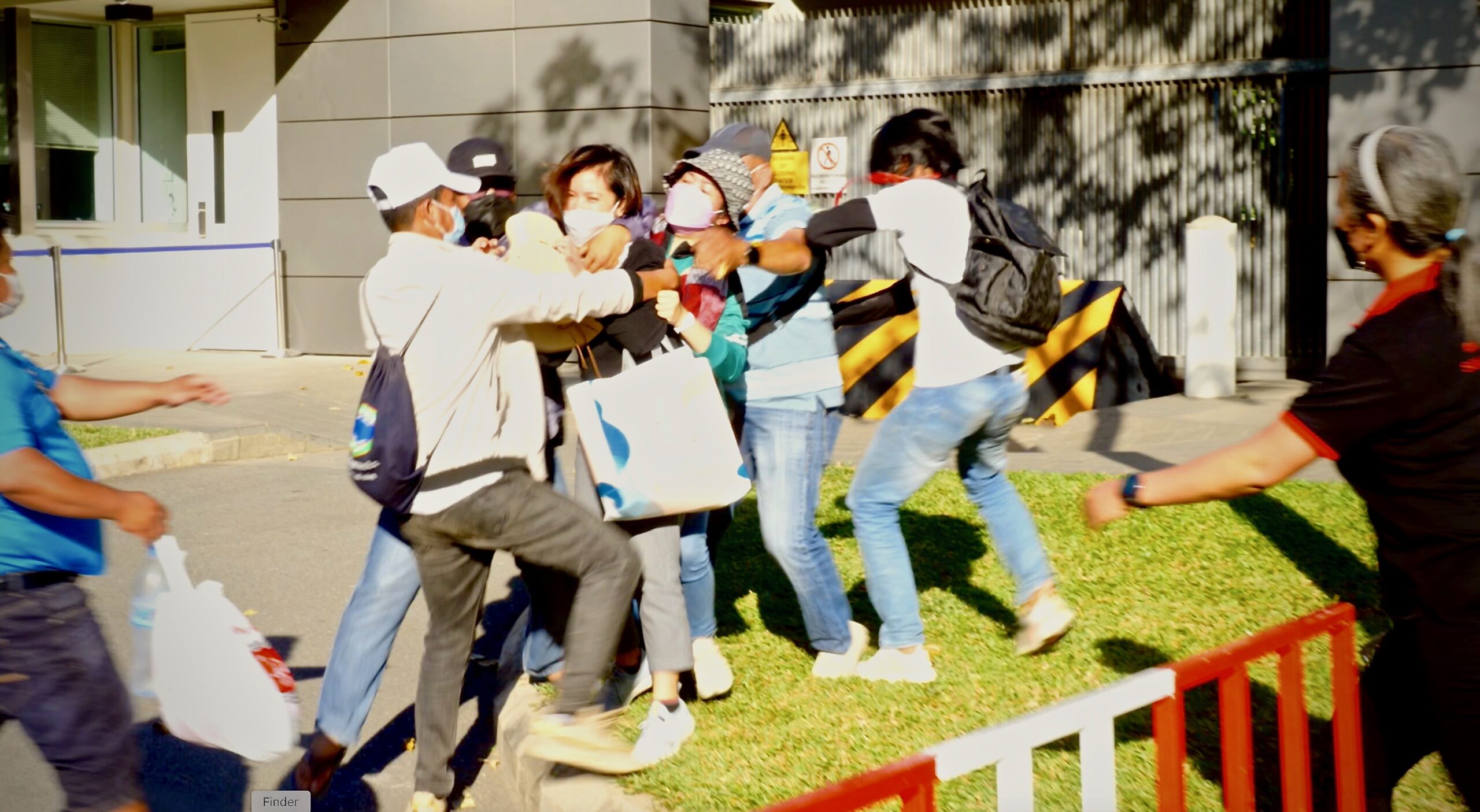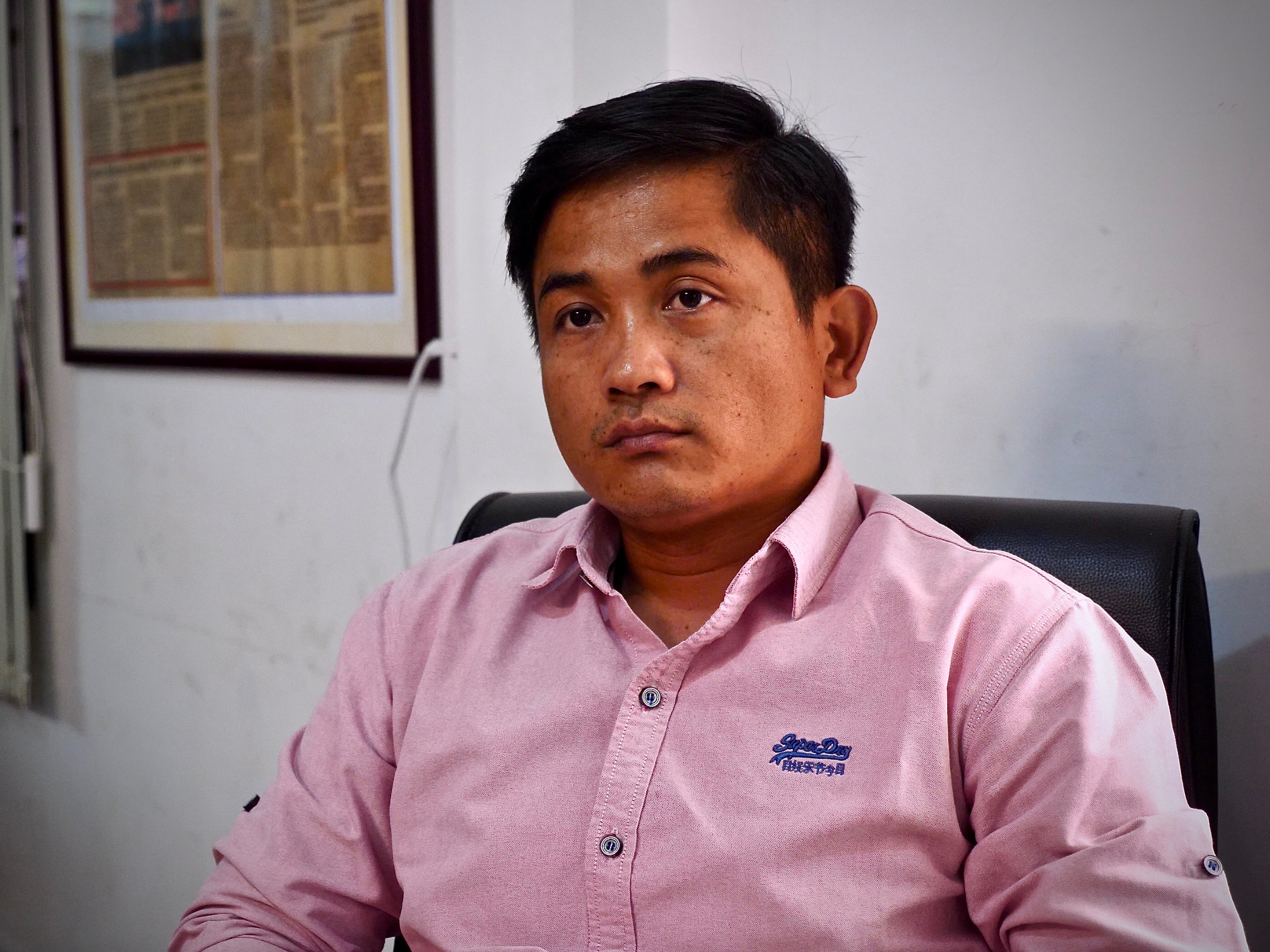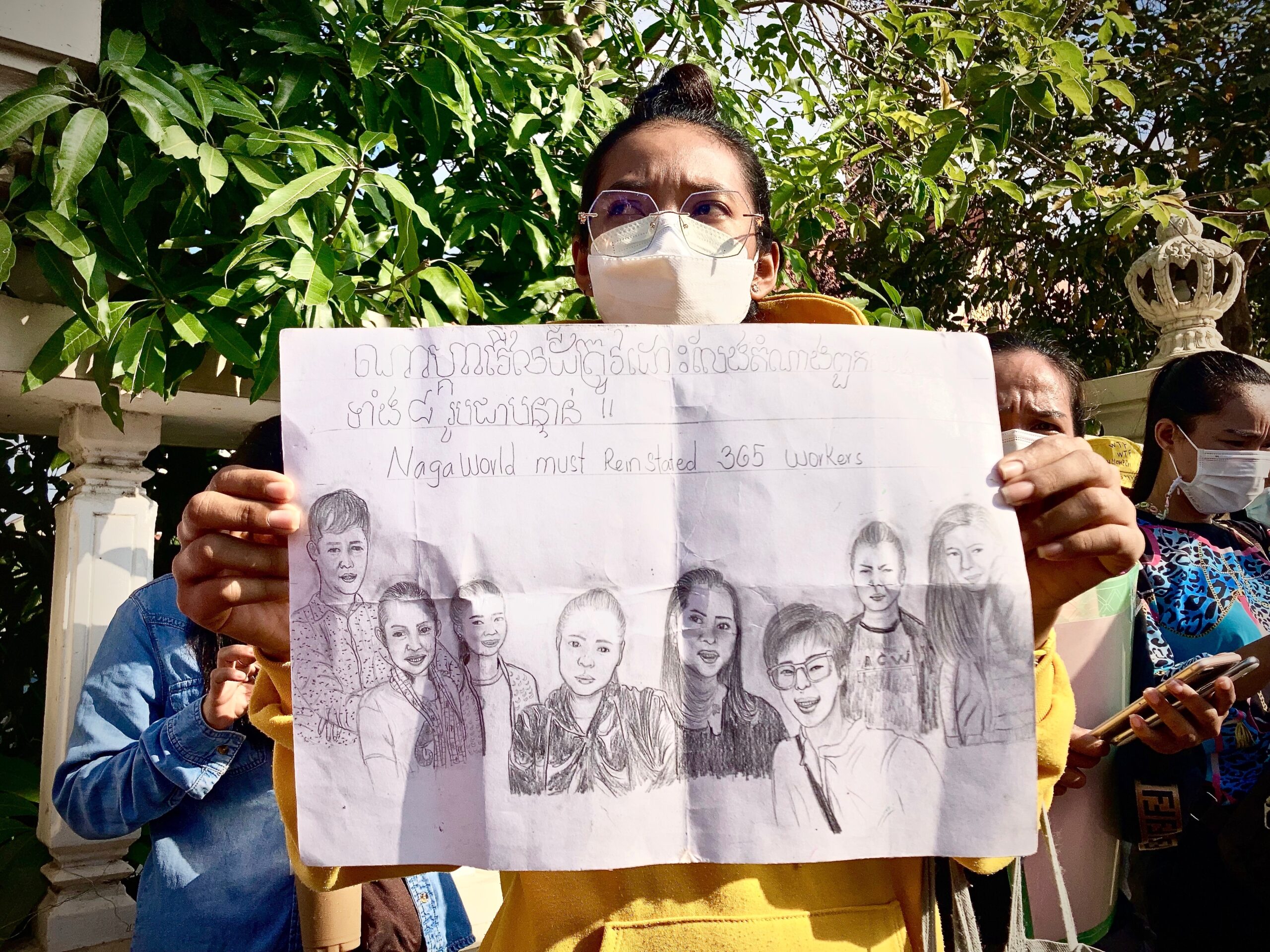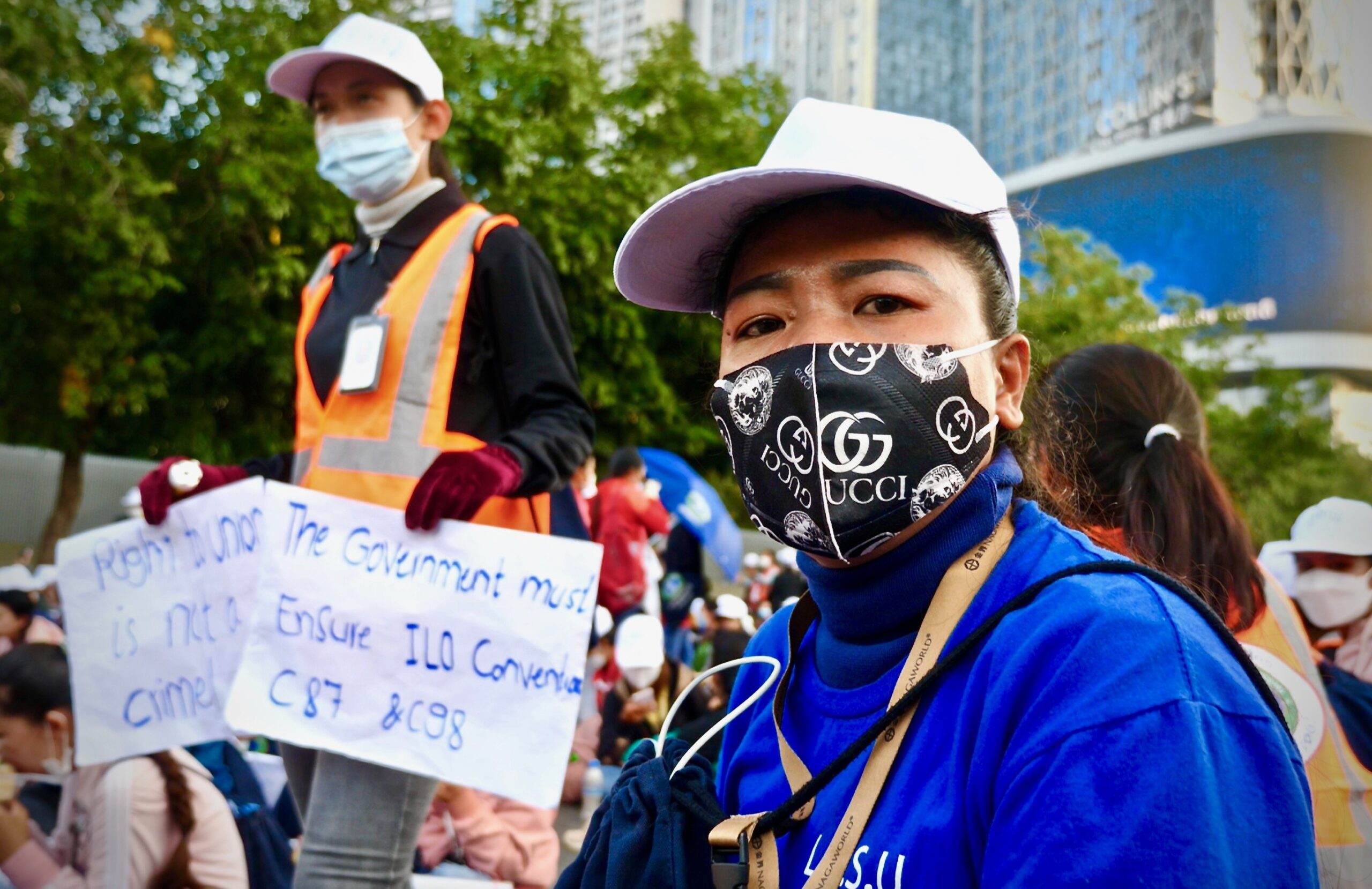Chhim Sithar knew she would be arrested when she arrived at the site of a protest organised by employees of the NagaWorld casino.
Police violently grabbed and arrested the union leader when she attempted to join the demonstration by striking workers in Phnom Penh on 4 January. Video of the altercation, showing Sithar trying to evade shouting plainclothes officers who swarmed and pushed her into a car, was widely shared on social media.
Sithar was one of 1,329 NagaWorld employees laid off in April during a Covid-19 surge in Cambodia. NagaWorld, which has exclusive rights to operate casinos in Phnom Penh, fired all the union’s leaders and has not given workers their full severance pay, according to the Labour Rights Supported Union of NagaWorld employees (LRSU).
The morning the strike began, 18 December, the Phnom Penh municipal court announced the action was illegal.
“They left us no other choice but this choice,” said Sithar, president of the LRSU organisation representing about half the NagaWorld workforce. “[Otherwise] we will lose our union and we will lose our voice in the workplace.”
Sithar and seven others connected to the strike were imprisoned on incitement charges, according to Central, a labour rights NGO. There were 31 arrests connected to the protest as of 10 January.
Authorities claimed Sithar, who was detained as the strike entered its third week, acted as a “mastermind” who manipulated workers. She said the strike represented the collective demands of hundreds of employees.
The union said the arrests violate United Nations International Labour Organisation (ILO) conventions. ILO director-general Guy Ryder appealed to prime minister Hun Sen to release the detained workers.
Striking employees say their actions are not political and are directed only at Nagaworld, a subsidiary of Hong Kong-listed NagaCorp. Nagaworld posted a $102 million profit in 2020 with more than 8,000 employees.
Union members, human rights NGOs and labour movement researchers said the strike represents a critical moment for the future of Cambodia’s independent unions and their right to organise as authorities criminalise labour advocacy in an increasingly limited civic space.

A case review by Cambodia’s Arbitration Council, an independent body established in 2003 with UN support to review labour disputes, declined to rule on the legality of the mass layoffs.
Yet the council did not find NagaWorld without fault, ruling the company failed to provide workers with their full compensation package, which was based on less than half salary and part-time employment paid during Covid-19 lockdowns. In a non-binding resolution, the arbitrators ordered the casino to recalculate the severance.
“These workers have already taken this case through all the correct legal channels,” said Sabina Lawreniuk, a University of Nottingham research fellow who studies Cambodian labour movements. “They’ve been given an award decision that essentially recognises that they’re right.”
NagaWorld employees lack leverage to enforce council decisions, which carry more weight against international brands held accountable by consumer concerns over sourcing, Lawreniuk said.
The Ministry of Labour and Vocational Training, which did not respond to requests for comment, acknowledged a possible miscalculation by the company, according to Central.
Release our leader and make proper negotiations or else we will stand here
Leng Sophall, protestor
As pandemic hardships lingered, many of the sacked workers accepted the compensation packages. But more than 300 employees, including all the union representatives, refuse to accept the severance.
In the front row at the demonstration near NagaWorld on the day of Sithar’s arrest, Leng Sophall said workers would not stop until their demands were met.
“We ask NagaWorld to come forward and give us solutions,” she said. “Release our leader and make proper negotiations or else we will stand here until there is a resolution from the company.”
NagaWorld spokesperson Dan Riley said the company would not comment due to the “ongoing legal process.” NagaCorp, which is listed in Hong Kong, did not respond to requests for comment.
NagaWorld employees said in a statement they chose to strike only after management refused “to engage in genuine or good faith negotiation” and the labour ministry and Phnom Penh City Hall failed to facilitate a resolution. Spokespersons for the municipal police and city hall did not answer questions submitted by the Globe.
Government-aligned media outlets and anonymous Facebook pages have distributed misinformation claiming foreigners have helped organise the strike.
At a 4 January press conference for handpicked media outlets, authorities claimed union leader Sithar was inciting the strike and foreign funds linked to the union were evidence of illegal activity.
Lt. Gen. Buth Sosikha, Phnom Penh deputy police commissioner, said an investigation “found tens of thousands of dollars donated from overseas and local organisations to support the strikes” and money from a foreign organisation was transferred to Sithar “to conduct the strikes.”

A Cambodian Centre for Human Rights (CCHR) attorney said Sithar was questioned about support the union received from the East-West Management Institute, which is funded by the US Agency for International Development, commonly known as USAID. US Embassy spokesperson Chad Roedemeier said in a statement that the US government “supports labor rights and standards in Cambodia, including through… the East-West Management Institute.”
CCHR lawyer Sam Chamroeun, who represents Sithar and eight colleagues, said laws concerning unions do not prohibit foreign funding, while their arrests are “not based on the facts and law.”
The NagaWorld union has complied with all legal procedures, while declaring the strike illegal and arresting members is an attempt to bust the NagaWorld union by enabling the company to fire union leaders, according to Central programme manager Tharo Khun.
“It’s really undermining the freedom of association,” Khun said. “Union leaders, shop stewards and delegates receive special protection by the law. If NagaWorld can dismiss those union leaders and shop stewards, then any other employers can do the same.”

Anna Salmivaara, a University of Helsinki doctoral candidate researching Cambodian labour movements, said trade unions have been “the biggest, the most significant social movement that’s been mobilising since the 1990s in Cambodia.”
Significant Cambodian labour movements have included a 2010 national strike and a 2013 garment worker protest, which brought hundreds of thousands of people to the streets and violence from authorities.
Increasingly restrictive policies have been part of a broader suppression of civic space as the ruling Cambodian People’s Party consolidated power, critics said. The efforts included a 2016 trade union law criticised by human rights groups for limiting labour organisation activities.
Threats of violence and union leader criminalisation have become regular tactics to delegitimise and intimidate the labour movement. Yet these efforts are unable to suppress worker frustration as Cambodia continues posting high GDP growth rates without proportionate wage increases and worker benefits, Lawreniuk of Nottingham University said.

“Worker discontent is real,” Lawreniuk said. “Whatever obstacles the state puts in the way, [the labour movement] tends to find outlets to express them.”
Despite a heavy police presence, NagaWorld workers continue to gather, waving signs, chanting and vowing to strike until their union leaders are reinstated and they receive full benefits.
“Who wouldn’t want to be working comfortably in their office, rather than coming out to strike under the sun,” said Chhuon Saman, a casino operations dealer. “But we are all upset and just striving for our rights, for our rice pots, for our stomachs.”
Additional Reporting by Samphors Sao.
Photos by Jack Brook for Southeast Asia Globe.


